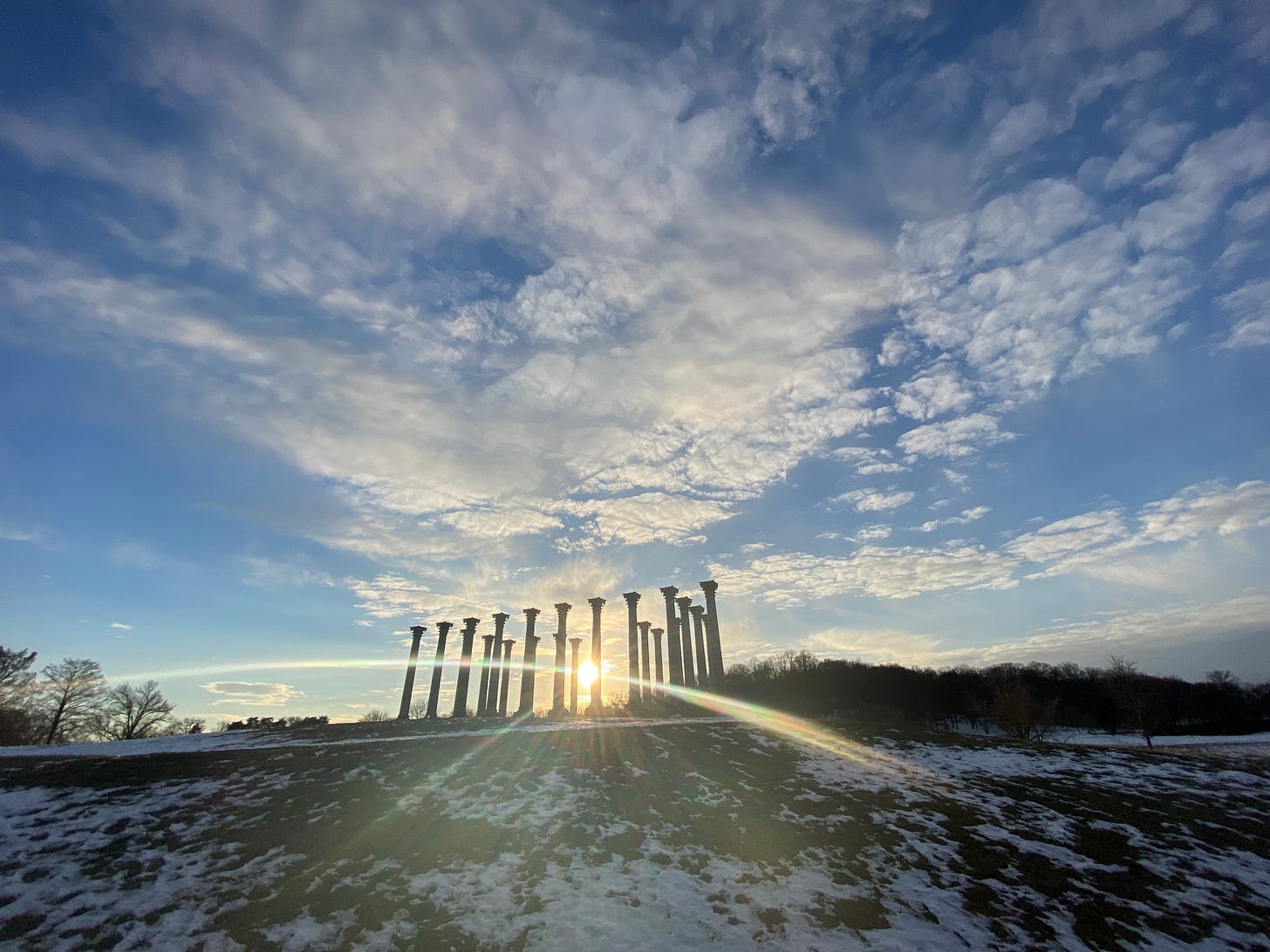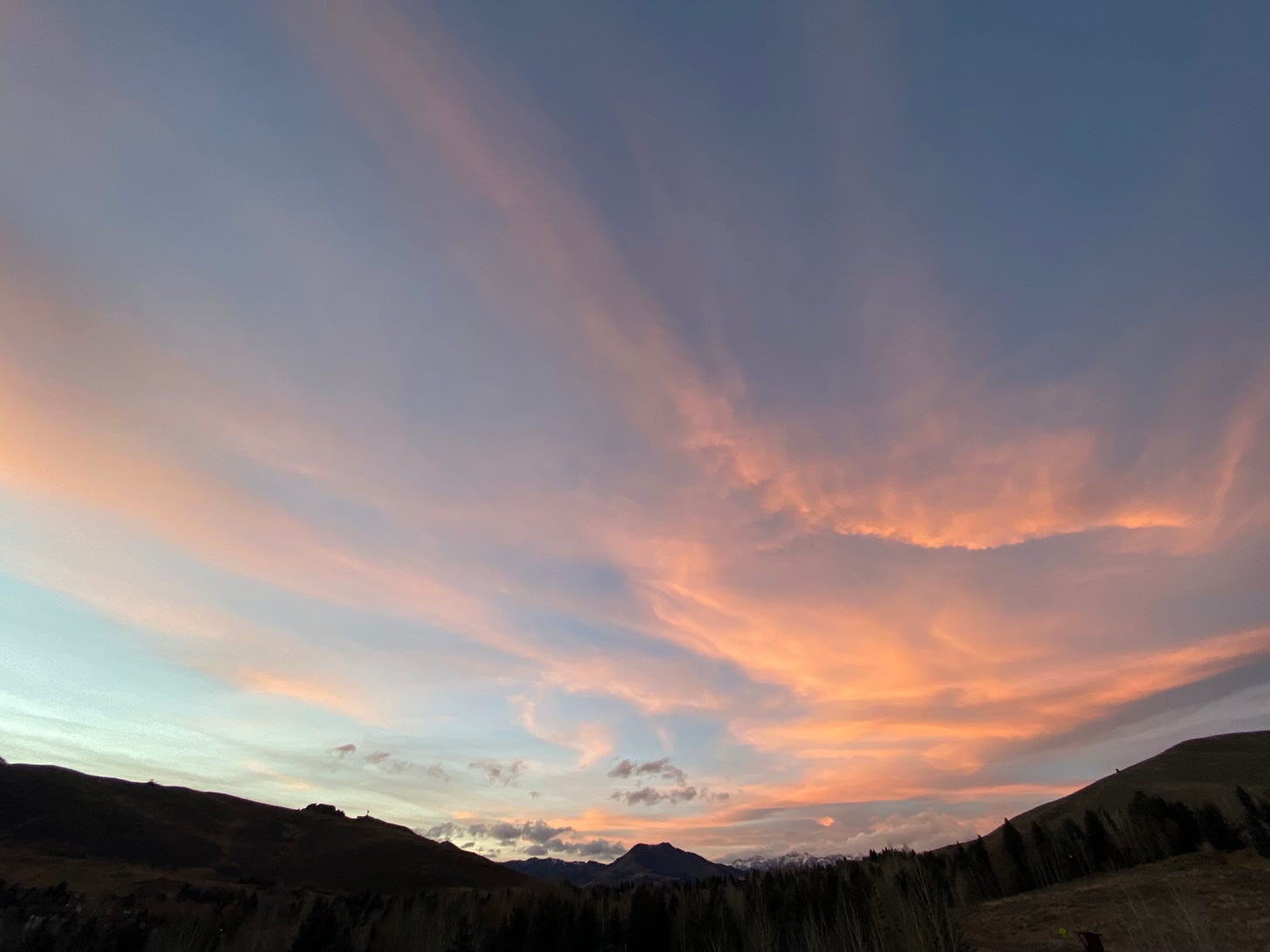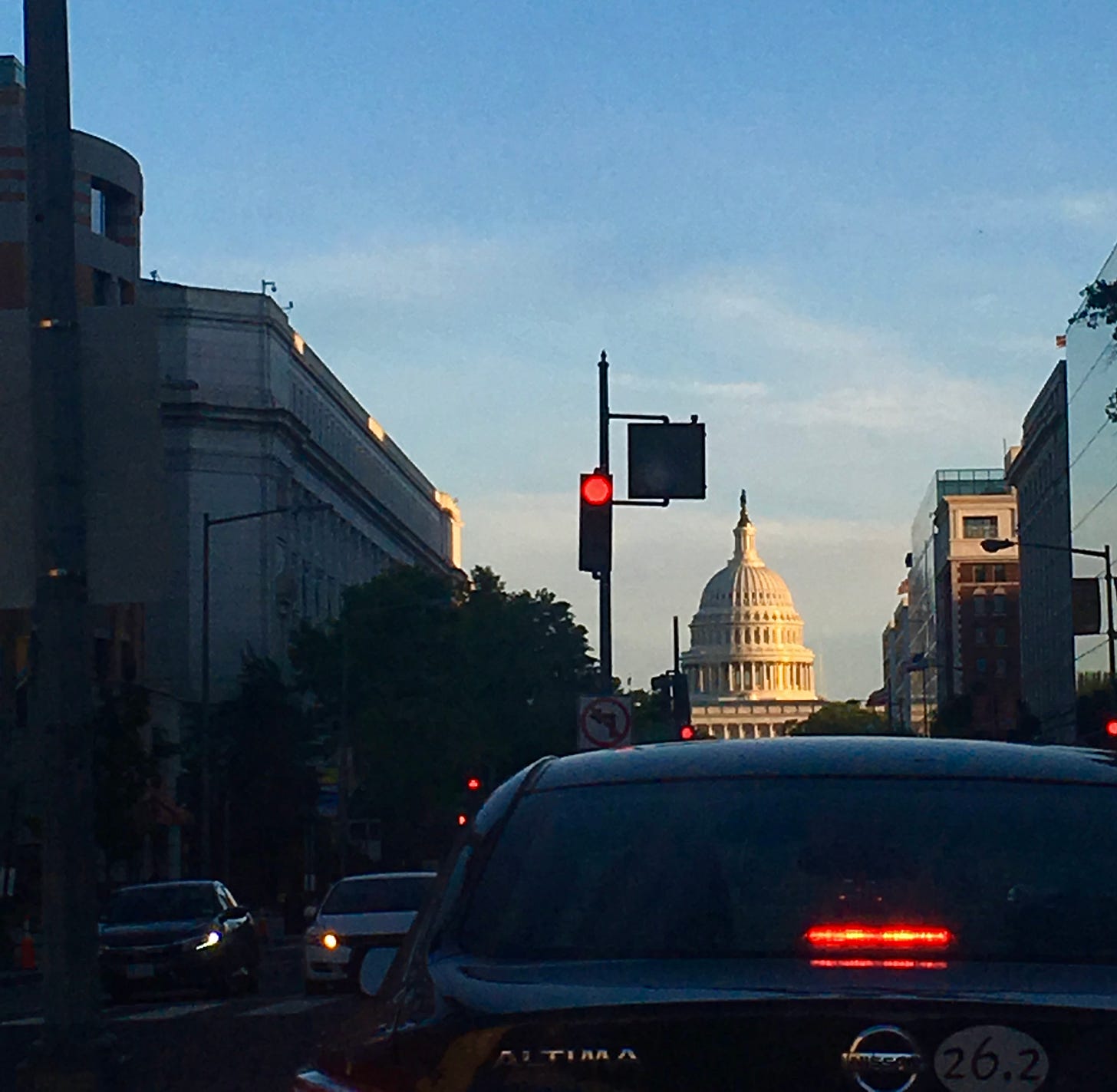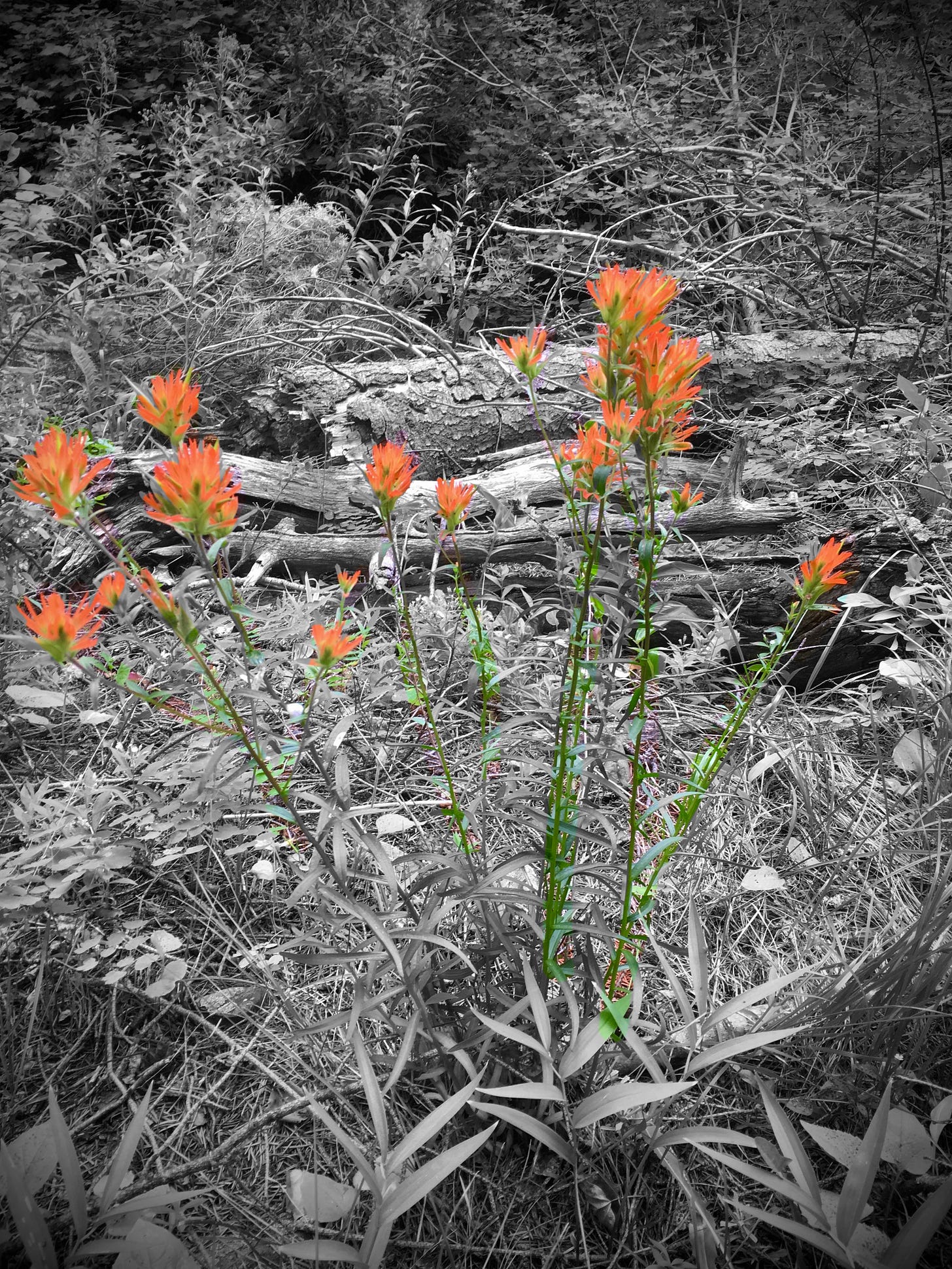The sacred American spaces desecrated by the American president
The American faithful must find their voice if the divine American idea is to survive

With a name like McKew, you can guess that my family was Catholic — Catholic on both sides, all the way down, as is often the case. As children, my sister and I were put in Catholic school — education was extremely important to my parents, Idaho public schools were behind in major areas, and Catholic schools were really the only alternative. But even with kind teachers instructing us the on softest, most-cleaned-up, golden-rule version of Catholicism, there was — when it came to my young mind, at least — a major ideological competitor: Idaho itself.
We grew up wild, remote, far from extended family, running in mountain cathedrals and in drought-stricken valleys, baking in the high-desert sun by day and mesmerized by the Milky Way in the heat-starved nights, always tracking the dust or snow of Idaho back into the house when we returned. We marveled at the wide painted skies of the high-west sunrises and sunsets, watching each one like an act of worship in a half-settled place. Native flowers were rare in the drought years of our childhood, and when spotted — transcendent, alien, starkly beautiful against the sage and the rocks, unique to this place which felt out of time.
Whatever school tried to say was spiritual, we found a hundred-fold in the wilderness we lived adjacent to. I used to look off the edge of the bluff our neighborhood was on and wonder how it was that the mountains vaulted so far into the sky and yet the western heavens were so much more vast and unreachable than those our east coast family lived beneath.
I think we Americans — looking down now into our phones and enrapt by the psychological terror the algorithms are designed to wield on us — often forget how utterly, spectacularly, heartbreakingly beautiful our country is. How it must have been astonishingly, mindbendingly miraculous for those first generations of foreign settlers who arrived — traversing Atlantic seas with fish and whales so dense you could “walk across their backs;” walking beneath towering Eastern old growth forests full of game and dappled with rich, open farmland; crossing the sweeping multi-hued plains with its endless empty horizons and rivers of buffalo; climbing the high-west mountains and deserts and red rocks and streaked canyons; and finally tumbling out into the sunset Pacific and its array of bounties up and down the coast.
For many of the peoples who came free or semi-free to the new America, it was an escape from nations where land was never yours, where hierarchies and social orders were a prison, where non-conformist beliefs where a death sentence, where being left alone to live how you pleased was impossible because everything in nature belonged to someone else — where absolute freedom was so far away, even the dangerous crossing off the former edge of the map seemed a better bet than what they knew.
Yes, there were the wealthy governors and landed gentry of European title attempting to rebuild the benefits of such tyranny in a new land, too, and yes, this is massively simplifying the colonization of the land that would become America. But my deep belief in the wonder of the natural world I grew up in led me to the second pillar of my core beliefs — America itself.
The earliest formative notions of what America was still shape how I see it.
That the very emergence of America from all the possible paths of history was like the lone stalk of bright vermillion Indian paintbrush reaching up from sandy soil between two rocks on the side of a mountain — impossible, miraculous, not to be taken for granted.
That in those end days of the Cold War, what we believed we were remained as important a beacon of hope as it had ever been.
And that — as eventually learned in Idaho, from local history of supplanted indigenous cultures and the Japanese internment camps Idaho was home to during the Second World War — part of what made us strong as a nation, allowing us to remain devout to our core beliefs, is that they were constantly tested by our own failings. We screw up, and that forces us to get better — we confront our own wrong history and mistakes, learn about those who had to fight even harder for the rights and freedoms we have, and incorporate them into our own shared story of the quest toward the more perfect union.
What a unique idea this was — that America was a moving target, a spirit always in motion, lost if believing perfection has been attained but thriving in the idea of the pursuit. It made America seem ageless and immortal — constantly being remade, reforged, sharpened and honed.
I don’t think we Americans consider enough the bravery it would have taken for absolutely ordinary people to come here with nothing more than hope — a deep unspoken belief that somewhere, there was something that would finally be their own.
And I don’t think we consider enough the bravery of all the Americans and eventual Americans we served less well than we should have as they tried to pursue their own possibilities — that their struggle towards our own beliefs actually proved the truth of what we held sacred. We just needed — still need — to continue the quest toward the more perfect.
This common feature of belief — of the zealotry of possibility and progress — is, for me, more than anything, the idea that shaped America.
That zealotry — let lose under the vast American sky, shaped by the wonder of the land, forged by the demanding and harsh life of making something from nothing, whether in forge or field or frontier — finally emerged via the fire of revolution as the divine American idea. The idea of possibility, and the idea that it moves toward the more perfect. That there is so much more to come, and freedom is the best way to achieve the possibilities we know not yet how to even define.
In this American religion, there was, most crucially, no savior. Instead, the power for salvation is bequeathed to each of us — as an American birthright, and an American duty.
A humble surveyor becomes the victorious general of a revolution and the foundational president of a nation. One freed slave helps craft our very conception of democracy, and another collects intelligence that will help win a war to free the rest of her people. A handful of astronauts know enough math and engineering to save themselves and the American quest for the stars from death in space.
We’re shaped by the big stories of salvation. But we’re educated and inspired by the small ones. A band of brothers. A family crossing the frontier against impossible odds. A hometown coach and a winning season. A cancer survivor who runs a marathon. In my own family story, a young man whose family of German-American brewmasters was utterly upended by Prohibition and sought a new life in San Diego, delivering my grandfather — through a series of hard-won yet improbable opportunities — to Pearl Harbor, where he helped cut sailors out of wrecked ships and wrote the final report on the damages.
Our smaller stories connect us to the bigger ones, which is why it’s so important that we share them.
America’s heroes aren’t always angels and they aren’t always good guys. We love a rogue and an outlaw as much as an honorable man. We love a redemption story woven into a good tale of salvation. But it is the action toward possibility — a pursuit of salvation — that buttresses the mythmaking of our identity.
And in this incredibly fraught time when we have lost all sense of ourselves in an absolutely mad way, it’s time for us to reckon with why we all feel so much has been taken from us. Whether the nation is betraying us, or we, the nation.
America has always been a religious nation, but we quell away from openly discussing our secular American religion — which was never about God as much as it was about us — about what our beliefs, whatever they may be, can together conjure toward the common purpose of the never-reached target of the more perfect.
Presidents like Teddy Roosevelt absolutely spoke of American divinity in their reverence for the land and how it shaped us; those like Abraham Lincoln spoke of the necessary sacrifice of the Civil War as a penance for our foundational sins.
Our modern caution in using religious terminology to describe our secular devotion seems now a great mistake. It has ceded the power of the words of true belief to those who would use them to make freedom a finite and contested resource rightfully held by only a narrow few. Freedom has never been finite in America, just as possibility can’t be limited if our core tenets of American identity are to continue to flourish.
America was and is a miracle. Its core ideas are spiritual, and require lifelong devotion to pursue their realization. Dedication to such tasks, and service toward the pursuit of the more perfect, can make a life — big or small, rich or modest — meaningful and transformative. The state of perfection can never be reached, as the entire point is that dedication to the work — pursuit of possibility — has no end point.
Our founding fathers — and especially George Washington — were wise enough to allow us no king and no national deity. Instead what is divine is the idea of sacrifice in the pursuit of freedom. This central, amorphous, imperfect idea is why we have survived in our first republic — shit goes awry, but the sacrifice of great women and men to restore the sacred course of the nation toward something better is not a sign of failure but of strength. Of commitment to the original and most divine American idea.
This is American divinity. Our secular and binding religion. We wander way off course an awful lot of the time — but that shining beacon on the hill is for us as much as anybody else.
There aren’t many sacred spaces in this secular American religion. But three in Washington DC stand out.
One is the US Capitol.
The sacred space of lawmaking, of debate amongst the peoples’ chosen representatives about the shape and direction of the nation we will be. Many Americans take an 8th grade class trip to Washington and walk under the soaring Capitol dome for the first time, passing quietly in a kind of awe, whispering beneath this most American cathedral so as not to offend the watchful spirits of the men and women who have lain in state in the rotunda.
Having lived in DC since mere days after 9/11, there’s never a season that dome doesn’t look glorious on the Hill — above pinks and whites and new greens in spring, reds and golds in autumn, the glowing greens of summer, the stark beauty of the dome and the Statue of Freedom standing alone against a stormy sky. Or other days when the dome fades into the gray white sky as snow falls on the slopes of the Hill, and the children of the city bring makeshift sleds and squeal in delight at such informal joy in the shadow of such a mighty parent. There’s never a time of day when the light hits the Capitol in a way that doesn’t catch the breath a little — the soft morning light, the bright midday sun, the golden dusk, lit up against a sky full of stars and a rising full moon. The dome forbids you to walk by with a jaded heart about the significance of what you are seeing.
But we know this President watched on TV as a mob set the Capitol on fire, and he prevented the deployment of forces to stop it faster. The people responsible for this cataclysm he has pardoned and set free, even as he requires his adherents to deny the event ever happened. It has resulted in a psychic break in some of those followers — people who couldn’t believe what they were seeing, had a moment of a wake up, and now believe that everything must be a psyop or a simulation. Nothing is real and anything is possible because he made you deny what you saw with your own eyes.
The insurrection attacked a space sacred for all Americans, and has rendered it sullied and profaned. Perhaps in time this could be forgivable — but it should not be forgettable.
A second sacred space for Americans — and in particularly those who have served in uniform and the families of those who have sacrificed their lives in defense of the nation — is Arlington National Cemetery.
On rolling green hills adjacent the Potomac, every vista in Arlington shows a different part of the nation’s capital. In every view there is a monument to catch the eye that is a reminder of what those buried in this hallowed ground had to fight for — of what their sacrifice preserved for us. The geometric rows of identical white gravestones force order on the land, which it resists with steeper slopes and soaring old trees. It is the contrast of the two that makes the place so aching beautiful, and that beauty is so much more poignant for the deep quiet that the place holds onto despite planes and helicopters flying overhead at all hours — and often taps playing somewhere in the distance.
The rows seem to go on forever in all directions. The immensity of the sacrifice of the place — and its point of origin after the devastation of the Civil War and one of our greatest leaps toward attaining our ideal (ending slavery) — weighs heavy and yet uplifts. The names on the headstones represent the origins of Americans from all over the world, including many true indigenous Americans; captains next to privates next to colonels showing each sacrifice is equal, as each life was equal; symbols representing so many different religions, many visitors don’t know them all. The homogeneity of the stones belies the diversity of the people who fought to keep America and its divine ideas alive.
The President has never been able to set foot in Arlington with appropriate reverence for this sacred space. He veers into political attacks, gets bored, and his staff causes scenes, generating headlines that remind us of the President’s narcissism rather than the story of even one single person who has earned the right for burial in Arlington. He doesn’t understand it. We know this because he has bragged about how he avoided his own military service, and we know this because the generals who tried to serve him told us about his comments about “suckers” and “losers.” His loyalists have now erased the stories of sacrifice of Black and female servicemembers from the Arlington website as part of their absolutely wrong pursuit of equality equaling people who look exactly like them and believe exactly what they believe. The digital purge can never hide the truth of what the gravestones tell us — the truth of the long lists of names of the men and women buried in Arlington and at military cemeteries all across America, in Europe, and indeed on every inhabited continent.
The Capitol and Arlington are spaces the public has access to, though post-9/11 and post-1/6 there have been significant security changes. The third sacred site — the White House — is the house the people keep for the President, and thus it is the most mysterious.
Part of this mystery is what preserves the idea of an American President as one of us, but one who stands necessarily apart to preserve the sanctity of the office.
I can’t even write at great length about the White House, so fresh is the wound of its maiming. My first memory of it probably isn’t even my own but one formed from family stories of one photo of my sister from the White House Easter Egg Roll when I was still a toddler. Growing up in Idaho, this was like finding out your family had once visited royalty somewhere — there she was, mere steps from the Truman balcony! When I moved back to DC in those post 9/11 days, when the city was empty and the flags seemed to be at half-mast forever, I remember how sad it made me that there were new higher fences separating the people from the White House, and the view of it seemed to be from further and further away.
When John Adams was moving into the new White House on November 1, 1800, he wrote to his wife: “I pray heaven to bestow the best of blessings on this house, and all that shall here after inhabit it. May none but honest and wise men ever rule under this roof.” FDR had this blessing engraved on the mantle of the State Dining Room, where presumably it still stands unless someone has also taken a sledgehammer to it, how would we know? Trump destroyed property that belonged to the nation, and not to him. He destroyed a sacred site of the history of the nation, and all the ghosts and specters that remained. It was shocking, visceral, outrageous. It was sacrilege.
I honestly struggle to think what must have been going through the mind of any sane machinery operator when they are given the task to tear down a wing of the White House with one day’s notice and as quickly as possible. While Trump had been going on and on about his renovations project — home-decorating being the one creative impulse he actually has — the timing of the thing, mere days after the largest protest in American history which was explicitly against him and his vision of the use (and abuse) of the presidency, was exactly what it looks like: a great big middle finger to everyone who believes his power should be restrained by laws or courts.
But even bad kings know to respect the heritage sites that are the iconic symbols of their own power.
In his wanton wrecking of the White House, President Trump turns his rage into an act of profanity against the foundational beliefs of the nation, which he respects even less than our heritage sites.
There is a fourth sacred American space that is the birthright of every American that I would be remiss not to mention: American lands, its parks, its wilderness. In this, too, Trump has missed no opportunity to profane. Has he ever hiked up a mountain in the lesser eastern ranges and thought of the splendor those first American settlers must have seen before them, or seen the sunrise light up the majestic red and white walls of Bryce Canyon, or stood in the impossibly green valleys near Yellowstone looking up at the craggy blue and violet mountains soaring into the big sky? Has he even been near unmanicured nature and not thought “someone should pave this and build a tacky hotel”?
His continued attempts to sell off this American treasure unnecessarily to miners, developers, and drillers is an absolute betrayal of the land and divinity that birthed the very possibility of America.
Every American can visit these sacred natural spaces that inspired the generations before us to love this land, dream of the more perfect, and fight for the impossibility of what we have. But Mr Trump would prefer these be owned by other rich men rather than us. He seems to abhor the outdoors if it isn’t a golf course, just as he shies away from pets and other living creatures. I can’t remember if he has done one of the famous Thanksgiving turkey pardons. Maybe it doesn’t matter since now every day some turkey or another is pardoned by the White House.
The man who would be American king? No, that isn’t what he is. We just fear to speak the words of what he is even more than we fear to speak of the American idea as a religious pursuit, because naming him makes each of us complicit in our acceptance of a hybrid system that represents a greater return of tyranny than at any other point in our history.
Like denying the attack on the Capitol, we are supposed to call his tyranny liberty, supposed to believe his destruction of the fundamental federal compact is “more perfect” — rather than the end of that union completely. I hate my opponent and I don’t wish the best for them, he told us. He has abandoned his duty to be the president of all Americans, and his minions enthusiastically find ways to make Americans suffer, struggle, starve, and live in fear. They have no American faith.
250 years isn’t much in the overall history. While not an old nation, we are the oldest democracy. I think we all thought we would have a lot more time. Despite the grotesque merchandising, Trump seems to want July 4, 2026 to be not an anniversary but the day of birth of … something else.
But let us remember the divine American spirit — there is no American savior, but the duty of salvation falls to each of us. The more perfect is the task of each American generation, and we are no exception. Our chapter in the American story starts now.
Mr Trump wishes he could dismantle American democracy as easily as he inspires a mob to burn the seat of our democracy, as easily as he dismisses the service and sacrifice of hundreds of thousands for our democracy, as easily as he can destroy the house of all American presidents (but one) who preserved that democracy. Like at every other time in his life, he is trying to conjure money that is not his to manifest his desires — and surely he is finding accomplices in this task of pissing daily upon the laws of the land and the idea that they also apply to billionaires.
But his desire to be a serious and feared autocrat doesn’t make him so. His seeming desire for himself and his tech bro/vulture capital council to emulate Putin and his collective of oligarchs doesn’t yet mean a handful of men can dictate the lives of a nation via systems of control and the perversion of state resources into the private wealth that maintains and reinforces those systems.
Putin speaks frequently about long arcs of history and uses them to sculpt fictitious narratives of power that justify his modern crimes. One constant in all of them is the idea that systems of government that represent “the people” are the anomaly in the long human story of strongman rule.
There is no “the people” for Putin. The evidence of this is in the mountains of dead and wounded it has cost Russia to uncomfortably occupy a mere 7 percent of Ukrainian land since the fullscale invasion in 2022.
If democracy is the anomaly in a long dark history, America is the light that must be extinguished if you view the world as the KGB did, and still does. Or better yet — America should be turned into an anti-democratic force. America should turn itself — abandon its faith.
For Putin, he is the only salvation for a besieged Russia holding back the hostile non-Russian world. Trump and his ideologues have tried to spin a similar story of besiegement, and far too many have fallen for a version of it that allows and requires lawlessness.
But we have the duty of our own salvation. Though the White House not be blessed with an honest or wise ruler under its roof, that’s why its inhabitants barely settle in before they move on. Because America is constantly changing, and its leaders must be able to accept and guide that change rather than fight and betray the divine American idea.
Only when we forget that we are the Americans — and Trump the anomaly in our story — will he be the victor. He would take everything of meaning from us and replace it with cheap baubles that we are supposed to oooooo and ahhhhh over, just as the White House now looks like a tacky knockoff of a satirical Central Asian presidential palace.
So no, I won’t ooooo and ahhhhh, because f*ck that, and no, I will not even say thank you. No, I will not be silent — just as you should not, and just as all the current and former leaders of our nation, our congress, and our military should not, because the silence masks the terrible lawlessness with which Trump rends the White House, and it masks the terrible lawlessness with which Trump rends American divinity.
If you believe freedom is a necessarily scarce commodity, and if you believe that possibility must be only for a few if it is to be of value — if you covet an idea of America that is the smallest, most vulgar version and not the wide cathedral skies that have given us all a space to worship and live and love, to fail and struggle and strive and succeed — then you do not understand the miracle of the origin of this nation, or why it has survived. You don’t have the faith to be a defender of what is divine about America, or the faith that when this trial is passed, our steel will be forged stronger than it was before the last fire.
He can tear it all down — it teaches us no lesson but what a shallow, profane man he is, too afraid to walk the halls in the footsteps of wiser presidents. He can keep doing what our enemies have never been able to accomplish. He can stand with his complicit political, judicial, and financial henchmen before the rubble for photos — behind the high fence he hopes will keep us out. We are a nation of believers and the children of all the zealots of the America idea before us. False idols always fall. We will save ourselves again as we always have before and as this nation was born in the first place.
I often think of my mother in these times, who could not abide a bully or a liar or a tyrant. Her favorite of the Idaho wildflowers was the elusive Indian paintbrush. It’s a hardy and resilient plant, or it wouldn’t grow in even the harshest Idaho conditions — but it is nearly impossible to harvest or transplant. I used to pick her flowers that would fade before I made it down the mountain. Finally, I tried to dig up a plant and bring it down to her, with its native soil and rocks. It never worked. The paintbrush wasn’t a captive plant — it only flourished where it was meant to, free and high and wild.
Our American democracy, which I hope we remain devoted to, is like these mountain wildflowers. When we get too far from the divine ideas that make it possible, it will fail for all of us. Trump does not understand what is sacred, and he believes his vulgarity is more powerful than our collective story and the ideas that they are born from and feed into. I think that he will fail, because I think we will remember the impossibly brave people who arrived to build America and who have always fought for the more perfect version of it against long odds. What is a more American fundamental belief than that the brave come out on the right side of history, in the end?
This administration may erase our history and profane our monuments and pervert our national story to justify their crimes and the way they exert power to accomplish them.
But I know the truth. You know the truth. I remember the vast American sky and the rogue vermillion flower and the open American heart and the divinity of the pursuit of the more perfect.
Our president isn’t trying to be better and he isn’t trying to be more perfect. He doesn’t believe he can ever be anything more than what he is. He is constantly afraid that someone around him will achieve something he can’t, and so he takes the more and the better away from everybody else.
This is simply not how America was forged. In the poverty of Trump’s American faith comes the impoverishment of our founding ideas — and the fractures ripping America apart. The smallness of all he does makes everybody smaller. The smallness crushes bravery — of rich men, of political leaders, of supposed media and journalistic elite. No American wants to live this way. We remember the wide open frontier.
Getting America right has never been easy. In each of us, salvation. What will you sacrifice.
— MM
** Great Power is a reader-supported publication. In these times when we are all striving for ways to not be silent, I hope you will consider becoming a paid subscriber. Grateful for all who support and help share my work 🙏





